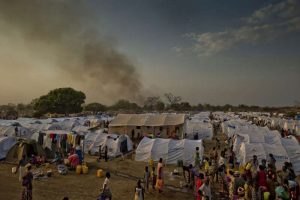Uganda the latest refugee hot spot
Uganda is emerging as one of the world’s largest hosts of refugees as hundreds of thousands of people pour across its borders displaced by conflicts in South Sudan and Burundi.
In recent months more than 400,000 refugees entered the East African nation fleeing South Sudan’s civil war and prompting warnings that Uganda’s resources are strained.
Uganda – which has a GDP per capita of just $US570 (Australia’s is $US67,000) – now has one of the world’s largest refugee camps.
 The daily influx of refugees has been above 3,000 people for several months, many of them children afraid of being forcibly conscripted into armed groups in South Sudan, according to the Ugandan Government.
The daily influx of refugees has been above 3,000 people for several months, many of them children afraid of being forcibly conscripted into armed groups in South Sudan, according to the Ugandan Government.
The government has said authorities will have to “be more creative” with basic support like food and housing if the numbers continue to rise.
Many refugees are getting half rations of maize meal and beans until more aid arrives from the World Food Program, it said.
Refugees in Uganda are often allocated small plots of land to grow their own food to supplement UN rations.
But authorities have flagged the possibility that allocating plots may no longer be feasible if more refugees arrive and they may have to consider ideas like building dormitories.
The refugee flood began in July when deadly violence broke out in South Sudan’s capital, Juba.
The United Nations says over 670,000 South Sudanese refugees are now sheltering in Uganda, which also hosts over 45,000 refugees from Burundi’s political violence.
To put the situation in perspective, more refugees entered Uganda last year than crossed the Mediterranean to reach Europe.
One resettlement camp in northern Uganda known as Bidi Bidi is now home to more than 270,000 refugees, one of the world’s largest even though it was set up only in August.
Tens of thousands have died in South Sudan’s civil war, which began in December 2013. The conflict often has been fought along ethnic lines. The United Nations has warned of possible genocide.
South Sudan is the world’s youngest country having gained its independence from Sudan in 2011. But it quickly descended into civil war in December 2013.
As the conflict has progressed, tens of thousands have been killed and more than one million people — roughly nine percent of South Sudan’s population — have fled into neighboring countries.
A fragile peace agreement was reached in 2015, but it broke down last July, sparking a new wave of fighting.
Following those clashes, hundreds of thousands of South Sudanese began leaving for Uganda, which has a domestic population of 37 million.
The situation in the South Sudan remains grim. Civilians and humanitarian monitors report gunmen carrying out rampant killing, looting and rape.
Villages are burned in the middle of the night. People are snatched from their homes and never come back, NGOs have reported.
Laurie Nowell
AMES Australia Senior Journalist












